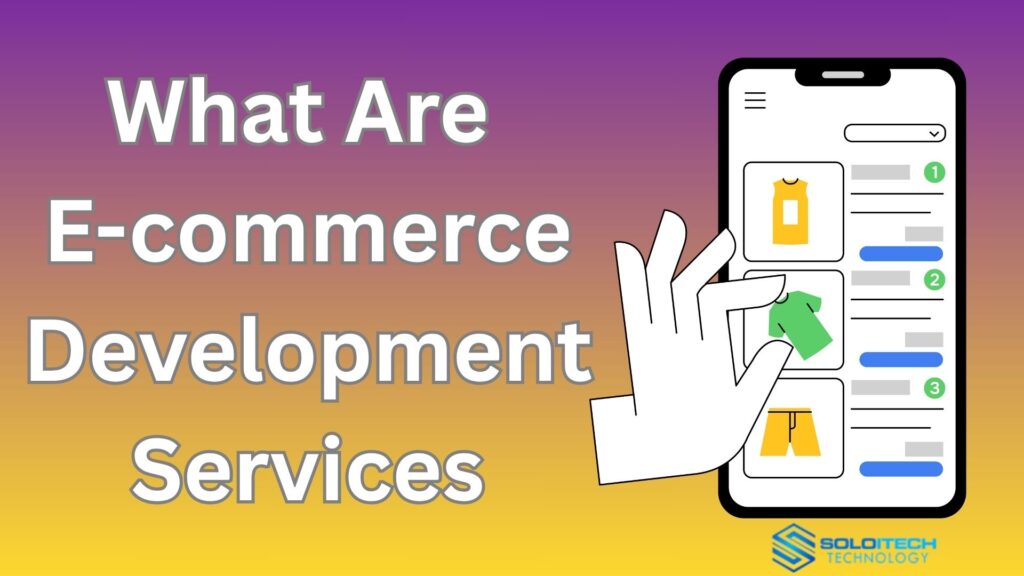In today’s digital world, e-commerce development services are specialized solutions to build, optimize and maintain online stores. These services cover everything you need to launch and run an online business, from website design and frontend development to backend integrations, payment processing and ongoing support. As e-commerce is changing the way people shop, companies of all sizes use e-commerce development services to reach more, sell more and deliver seamless shopping experiences.
E-commerce Development Services
- Website Design & User Experience (UX): Building visually appealing storefronts while ensuring intuitive navigation, clear product presentation and smooth purchase flow are top priorities. Great design is not just about looks; it builds customer trust, conversions and long-term loyalty.
- Custom Storefront Development: E-commerce services often deliver highly customized shopping environments to a brand’s identity. This includes developing unique features, custom catalogs and even different types of marketplaces (B2C, B2B, C2C, D2C).
- Shopping Cart and Checkout: A critical part of e-commerce is a reliable and user-friendly cart and checkout process. This streamlines the purchase experience, minimizes cart abandonment and gives customers the flexibility to pay in multiple ways.
- Payment Gateway Integration: Enabling secure transactions is core. E-commerce development services integrate payment gateways like PayPal, Stripe, Razorpay, and credit/debit card solutions, ensuring data security and compliance with industry standards.
- Backend Development: What users see is just the tip of the iceberg. Robust backend systems handle inventory, product management, order fulfillment, CRM and analytics. These are the foundation of a scalable and reliable online shop.
- Mobile Commerce: Many e-commerce solutions are now mobile-first or omnichannel, so customers can shop from any device.
- SEO & Performance Optimization: Specialists ensure ecommerce sites are optimized for search engines, fast loading and responsive so businesses can reach more customers and rank higher in search results.
- Platform Selection & Integration: Services include consulting and setting up the right platform (Shopify, WooCommerce, Magento) for each business model and integrating with third-party systems like email marketing, ERP and shipping providers.
- Maintenance & Support: Ongoing technical support, security updates, feature additions and troubleshooting keep the ecommerce website secure and high performing as needs evolve.
Types of E-commerce Website Development
E-commerce website development varies by business model:
- B2C (Business to Consumer): Most common, focusing on product catalogs, loyalty programs and personalized experiences.
- B2B (Business to Business): Bulk orders, negotiated pricing, role-based access and integration with backend systems.
- C2C (Consumer-to-Consumer): Marketplace-style platforms where users can buy and sell require robust user management and fraud prevention features.
- Niche & Customized Solutions: Auction sites, bidding platforms and subscription-based ecommerce are also supported by custom development.
The E-commerce Website Development Process
- Planning and Strategy: Business objectives, audience research and feature requirements are defined.
- Platform Selection & Architecture: Choosing (and sometimes customizing) platforms like Shopify, Magento, WooCommerce or building headless/PWA solutions for maximum flexibility.
- Design & User Experience: Wireframes, mockups and prototypes focused on branding and usability.
- Frontend & Backend Development: Coding interactive components, integrating APIs and setting up backend infrastructure.
- Content Creation: Uploading product catalogs, descriptions, images and multimedia.
- Testing: Ensuring consistent, secure and responsive across devices and browsers.
- Launch: Deploying the site live and implementing analytics tools for ongoing insights.
- Maintenance: Continuous improvement based on customer feedback and changing business goals.
What is E-commerce Website Development?
E-commerce website development is the end-to-end process of conceiving, designing, building, launching, and optimizing online platforms that sell products or services over the internet. It encompasses both the visible parts that customers interact with and the backend operations that keep the business running, such as inventory management, fulfillment, security, and customer relationship tools.
Components of E-commerce Website Development
- Frontend Development: What customers see and use, including layouts, search features, product pages, shopping carts, reviews, wish lists and more.
- Backend Development: The “engine” behind the store. Manages data, orders, payments, communication with suppliers, reports and integrates with other business tools.
- Security: Deploying SSL certificates, PCI compliance and securing personal and payment information.
- Mobile Optimization: Ensuring the website or app works flawlessly on smartphones and tablets, most e-commerce traffic now comes from mobile devices.
- Search Engine Optimization: Building the site and content for Google and other search engines to drive organic traffic.
- Analytics & Reporting: Integrating tools like Google Analytics to monitor traffic, conversion rates, and customer behavior for continuous improvement.
New Trends in E-commerce Website Development
- Headless Commerce: Separating the frontend from the backend means faster innovation and multi-channel selling (shop, app, kiosks, wearables).
- Personalization: Using AI to deliver product recommendations, dynamic pricing and targeted marketing.
- Voice Search & Conversational Commerce: Ordering via voice assistants or chatbots.
- Progressive Web Apps (PWAs): App-like shopping experience in browsers for speed and engagement.
Why E-commerce Development Services Matter?
- Global Reach & 24/7 Availability: Get customers from anywhere, anytime, without the limitations of physical stores.
- Better Customer Experience: A well-built ecommerce site makes searching, comparing and buying products easy, so customers come back.
- Operational Efficiency: Automate sales, payments and logistics and reduce costs and be leaner.
- Scalability: Easily add product lines, target new markets, or roll out features as your business grows.
- Actionable Analytics: Get real-time sales and user data to inform marketing and business decisions.
Conclusion
In short, e-commerce development services cover everything technical and creative to turn an idea into a successful online business. E-commerce website development is the practical process of designing, coding, integrating, and optimizing a digital store so businesses can connect with modern shoppers, be more efficient, and grab growth opportunities in the digital landscape. As the industry evolves, businesses that invest in e-commerce development will be best placed to stand out, adapt, and succeed.

